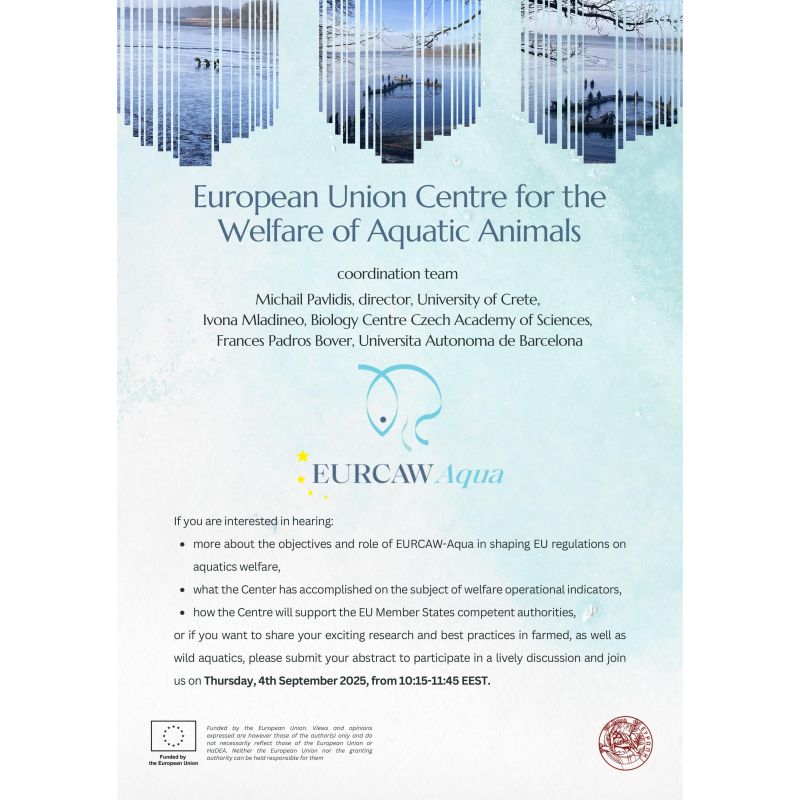Join us on Thursday, 4 September (10:15–11:45 EEST) for our dedicated session on aquatic animal welfare.
Stay tuned for more details here.

Aug 18, 2025
Join us on Thursday, 4 September (10:15–11:45 EEST) for our dedicated session on aquatic animal welfare.
Stay tuned for more details here.

Welfare assessment systems are important tools for evaluating the welfare of animals. This report provides a comprehensive review of existing welfare assessment systems for farmed fish, focusing on their methodologies, strengths, and limitations. It highlights the importance of welfare monitoring due to rising social concern and the ethical obligation to safeguard the welfare of farmed fish. Key findings include the variability of welfare indicators, scoring systems and integration models across species and farming systems. While many systems provide reliable insights into fish health, stress, and behaviour, challenges persist, including the lack of species-specific indicators, standardization of methodologies across species and production systems, and integration with farming operations. The report recommends the development of more holistic and standardized monitoring solutions to improve welfare outcomes and align with industry and regulatory expectations.
More info here
The rapid expansion of aquaculture has emphasized the urgent need for humane slaughter practices and reliable validation tools for the loss of consciousness. Many current methods, such as asphyxiation and live chilling, fall short of ethical standards due to prolonged fish suffering and poor outcomes. Gas immersion shows modest improvements but cannot yet be classified as humane. Electrical stunning holds potential, but its effectiveness is undermined by rapid recovery times and a lack of data validating its reliability under intensive culture conditions. Percussive stunning and central nervous system destruction is a better option but lack validation at commercial scales. Anaesthetics could reduce stress yet face regulatory and consumer challenges. Studies, especially on gilthead seabream and European seabass, highlight the importance of neurological assessments to evaluate stunning efficacy. The review stresses the need for rigorous, large-scale studies and collaborative efforts to refine techniques and set industry standards for ethical, humane fish slaughter.
More info here
Stavroula Tsinorema is Professor of Modern & Contemporary Philosophy and Bioethics, Director of Joint Graduate Programme “Bioethics” and Director of the Centre for Bioethics of the University of Crete
Athanasios Samaras, Scientist (Fish Physiology), Researcher at University of Crete, Department of Biology, Greece
Eleftheria Fanouraki, Scientist (Fish Physiology), Laboratory Teaching Staff at University of Crete, Department of Biology, Greece
Leonidas Papaharisis is an ichthyologist with a thorough expertise in aquaculture production, fish welfare and management of RTD projects.
Lluis Tort is Professor in Physiology at the Universitat Autònoma de Barcelona, Department of Cell Biology, Physiology and Immunology
Francesc Padrós i Bover Fish Pathologist (Vet) Universitat Autònoma de Barcelona, Department of Animal Biology, Plant Biology and Ecology
Ivona Mladineo Fish Pathologist (Vet) is Head of Laboratory of Functional Helminthology, at Institute of Parasitology, Biology Centre Czech Academy of Sciences, Czech Republic
Michail (Michalis) Pavlidis is Professor of Marine Biology and Physiology at University of Crete (UoC), Department of Biology, Greece. Member of the Governing Council of UoC